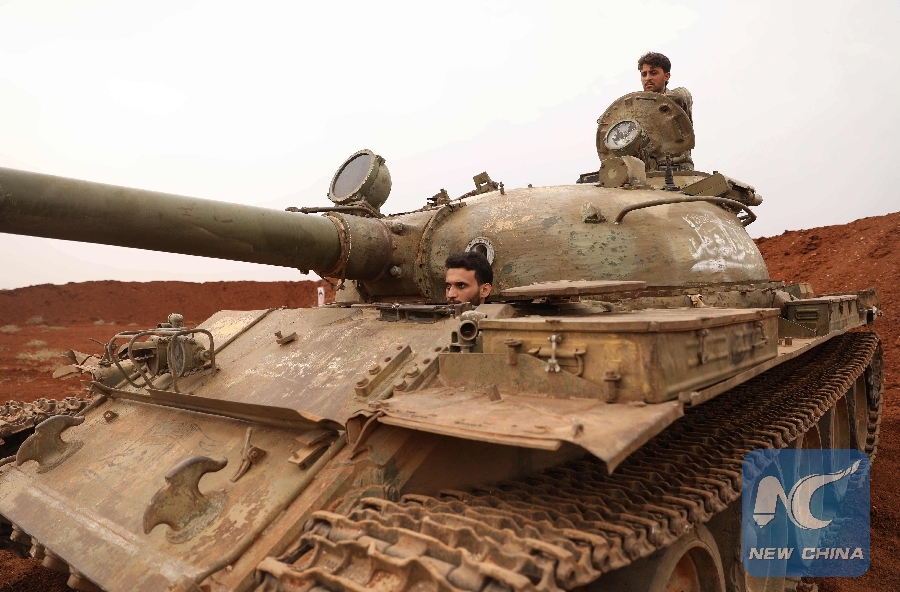
Syrian rebel-fighters from the National Liberation Front (NLF) secure a tank, part of heavy weapons and equipment withdrawn yesterday from a planned buffer zone around Idlib in one of the group's rear positions in a rebel-held area in the southwestern Syrian province on October 9, 2018. (AFP Photo)
ANKARA, Oct. 11 (Xinhua) -- Turkish President Recep Tayyip Erdogan has said his country will not leave Syria until a general election is held in the war-torn country, signaling that Turkish military would continue to stay in its neighbor country for an undetermined amount of time.
"Whenever the Syrian people hold an election, we will leave Syria to its owners," Erdogan said during an interview with broadcaster TRT World.
Turkey has an undisclosed number of troops in several Syrian regions along the 900 km border which separates the two countries. Ankara sent troops to Syria in August 2016 to clear a border area of fighters belonging to the Islamic State (IS).
It launched another operation earlier this year in the northern Syrian enclave of Afrin to remove Kurdish fighters of the U.S.-backed People's Protection Units (YPG), which Ankara considers as the local branch of the outlawed Kurdistan Workers Party (PKK).
Last month, Erdogan agreed with Russian President Vladimir Putin to establish a "demilitarized zone".
The planned buffer zone is 15 to 20 km wide and should be established by Oct. 15.
The zone will include areas in Idlib, which is the last major rebel stronghold in Syria, as well as adjacent countryside areas of the provinces of Hama, Latakia and Aleppo.
According to the agreement, heavy weapons, tanks, rocket systems and mortars of all rebels would be removed by Oct. 10.
For Turkey, sending troops to Syria is foremost on national security concerns.
"If a viable peaceful settlement is reached in Syria, all countries who have a military presence there should withdraw their forces. Otherwise, Turkish forces will not leave Syria unilaterally and no one has the right to demand that from us," said a Turkish government source to Xinhua.
"We have a national security interest to preserve. We are there because Syria is our neighbor ... we have to protect our interest and prevent any threat from this country," added the source on condition of anonymity.
Turkey has established 12 observation points in Idlib along with Russia and Iran. As part of its diplomatic efforts to prevent what the UN fears may be a "bloodbath" in Idlib, Ankara has been reaching out to other stakeholder nations.
Later this month, a four-way talk between Turkey, Germany, Russia and France over the Idlib situation is expected to be held after Erdogan made a state visit to Berlin in September.
The Turkish leader wants its NATO ally, the United State, to rush to comply on the roadmap which the two countries agreed in June to bring about the retreat of Kurdish YPG elements from the northern Syrian town of Manbij.
This location and the YPG has been a major sticking point in the strained relations between the two NATO partners. Ankara says it will not tolerate steps by the YPG to establish a Kurdish-ruled zone in Syria.
Erdogan warned that his country would do almost everything to clear Manbij city and east of the Euphrates river from the YPG.
Expanding Turkey's military campaign into the much larger Kurdish-held territory east of the Euphrates would risk of confronting the U.S. troops, deployed alongside a YPG-dominated force there.
The United States has around 20 bases and an estimated 2,000 to 3,000 troops in the area under YPG control.
However, experts believe that Erdogan's fierce remarks do not imply a prelude to a military confrontation but rather the will to put his mark in ongoing discussions with the United States over the sensitive issue.
"A military operation like the two cross-border operations that Turkey organized in the past is highly unlikely at this stage. Turkey preferably wants to increase pressure on the American side to abide by the 'roadmap' that they had established," Oytun Orhan, researcher from the Ankara-based think tank SETA, told Xinhua.
According to the expert, Turkey wants to put its newly-earned diplomatic power to good use by forcing the United States to finally cooperate and possibly concede on the Manbij issue.
In an attempt that seemingly aims to avert further escalation, the United States has sent its first batch of army personnel in Turkey to join training for joint patrols in Manbij.
However, this is far from satisfactory, according to Turkish sources, and the Manbij issue could be a new flashlight of the already heavily deteriorated Turkish-U.S. relations.
"Turkey's continued rhetoric that the next military operations in Syria will target YPG-controlled eastern Euphrates displays a blurry future in the Turkish-U.S. ties," Serkan Demirtas, local political analyst, told Xinhua.

